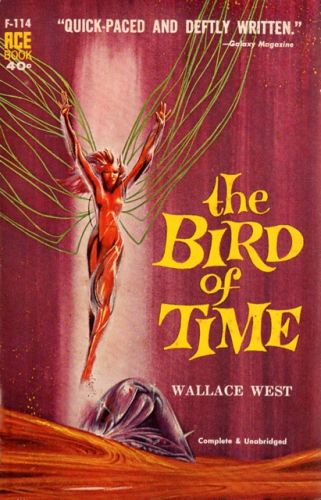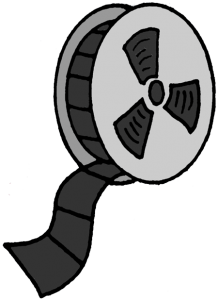
|
| Cover art by John Schoenherr |

Film This!

|
| Cover art by John Schoenherr |

| THE BIRD OF TIME Wallace West New York: Ace Books F-114, 1961 |
Rating: 5.0 High |
|||
| ISBN-13 978-0-441-? | ||||
| ISBN 0-441-? | 224pp. | SC | $0.40 | |
"As the long low light of sunset washed through the transparent plastic roof of the Agan Theatredrome at Croton (sic), capital of the Martian Anarchiate, a princess sat in her preening room and shed two precious tears." – Page 5 |
Mars was dying. Once, long ago, it had repulsed an invasion from Earth. But now its resources were slim: ores all mined out; fuels all but gone; technology fading. Mother Avron had a lot to do with the decline of what had been a high civilization on the Red Planet. So its sparse population played the hicks when the First Expedition arrived from modern-day Earth.1 Being telepathic, they could pull this off without a hitch. They pretended to be dazzled by the zircon in the ring of one General Horace Brown, the expedition commander. In reality, they needed zirconium for their technology: it was the key to getting their fusion piles and teleport working again. (The teleport had been stored in a dome at the south pole of Mars, where the Avron dwelt. She, powerful and nearly immortal, had become their succor when the young Martian race reeled back from failed attempts to colonize other star systems. But salvation shaded into dissolution as the centuries passed. When it was almost too late, a few rebelled and managed to keep a semblance of civilization going on the ravaged planet.)
Brown returned with the Second Expedition. Fortunately, two former members of the First Expedition arrived before he did, bearing tons of zircons. Bill Newsome and Jack Harkness, independent now, hoped to trade those zircons for some of the gold which the Martians had in abundance. They were met by Pitaret Mura, a sort of political boss for the Martian Anarchiate. If you can imagine a feathered Donald Trump about five feet tall, with large golden eyes, that was the Pitaret. He immediately set about scheming to regain Mars' former glory. He sent Jack with Princess Yahna of the Line2 to retrieve the teleport from the Avron. Probing Bill's mind, he hatched a scheme to flood Earth with gold, thereby bringing the world's economy to its knees. But he had to learn how much gold that would take.
"Twenty-five ...hundred ... tons," Bill tried to think. "Childish stratagems won't help. You really are thinking that twenty-five tons or so, dumped at one time, might do the trick. We have that much and more. For untold generations, gold was an end-product of our atomic piles." "Now you're being childish," Bill jeered. "Even I know that the end-product of radioactive decay is lead. Gold is in a different column of the atomic tablet—the one containing copper, silver, and other non-fissionable metals." "All metals are fissionable to a degree, and under the right conditions, my good worm. In the old days, when we had plenty of natural fissionables and power to burn, we used to knock three protons out of the lead nucleus and transmute it into gold for the embellishment of our cities and ourselves." "Later, when uranium, thorium, and all the other 'naturals' ran out, we took advantage of the fact that our abundant supplies of lead had a greater positive packing fraction than gold. We fissioned all the lead, although it took some doing, thereby obtaining still more gold, and a bit of energy into the bargain." "Have it your way." Bill was out of his scientific depth." – Page 34 |
Greedy General Brown falls for the scheme, quickly figuring that his three ships can lift an extra ten tons apiece off Mars. But Bill can use a "bug" to send Morse at 65+ words per minute, too fast to think about the content of the message. Being such an accomplished telegrapher, he manages to get the news to Earth — whereupon Brown is advised that if he tries to bring the thirty tons of gold back, his ships will be blown out of space. Mura won't let him unload it. He takes his ships to Mars orbit and jettisons the bullion brick by brick. Then he comes back and proceeds to antagonize the Martians enough to start an interplanetary war. But that war is only a sideline to the real threat...
The story is divided into three parts. The second, called "FLIGHT 2," begins on page 86. This is some time after General Brown escaped the debacle he caused at Crotan, taking Bill Newsome and the Martian teleport back to Earth. By now the war has settled into an overall stalemate. Newsome is part of an operation to censor the news that gets fed to the public. It is not going well.
One place where West does match the science of his day is in the science of mind. Freud's theories on the origins of mental illness were the trendy new tool for shrinks, and Freudian psychotherapy became the Next Big Thing. Central to the process was bringing suppressed memories of painful experiences into the open so the patient could learn to deal with them in a rational manner. But like so many other therapies, it spawned a host of abusers. Patients paid huge sums to analysts who validated their vagrant impulses. West illustrates this through one Dr. Grover.
"Using all the tricks of free association, Grover gnawed at his mind like a termite. He slammed doors in it, or so he thought. He opened other doors that looked out on horrible things . . . things he must have been taught during their previous seance but which had never risen into consciousness." *
* * "Grover was after his Super-ego now, that relentless, often stupid mentor built up ever since cave-man days to keep the over-enthusiastic Ego in check. He shook it like a rat, ridiculed it, exorcised it, bound it with thongs of words. A pity he couldn't tangle with those personified Super-Egos out on Polaris. They would give him a run for his money! "Next, Grover endeavored to build his patient's Ego to overweening proportions. He did that in the biblical manner, by taking Jack to the top of a high mountain and showing him the world spread out, ready for the taking by a cruel, unmoral, master hand." – Page 197 |
Freud's concepts of Id, Ego, and Superego are a reasonable attempt at describing the structure of the human mind. We now know, however that they have no exact counterparts in brain structure.5 More important, pharmacology had no part in his theories — even though he used opiates in treatment. Medical science in his day was only groping toward an understanding of the role brain chemicals play in behavior.
At this point, it's worth taking note of the fact that while the novel handles technology well, in a narrative sense, it mangles science in several ways. The fissionability of lead is not one of them; iron is at the bottom of the curve of binding energy. (Whether fissioning lead is economically feasible is another question, one beyond the scope of this or most any other novel.) Transmuting lead into gold is also quite possible, but hugely expensive — unless you have power to burn. But the only limit on West's rocket ships' ability to boost mass, apparently, is how much room they have in their cargo holds; an unbudgeted ten tons per ship is no problem for General Brown. I wish we had ships that worked that way.
Some other scientific and technological gaffes are:
Then there is the uneven application by the Pog, out on the third planet of Polaris, of their (its?) extraordinary abilities. I won't explain that one, because I can't do it without giving away too much of the plot. Let me just say that — like the plot — it revolves around Freudian psychology: the manipulation of Superego, Ego, and Id.4
Watching the endless snow, Jack was astonished that he could ever have been swept away by the dream of melting a polar ice cap within a few years. Even with the power of the atom, the task would require a few generations to complete. "It's not only that so much power is being wasted, Bill said. "Even if they should succeed in melting any great portion of the cap, do you know what would happen?" "My fur business, she go plum to 'ell," the pilot grinned. "Erosion and inundation of the coastal lands would more than offset any benefits obtained," Jack hazarded." "Worse than that. Earth would be thrown 'way off balance because the weight of the Antarctic cap would remain. Its axis would start wobbling like that of a badly balanced top." "Eventually the globe might tip. The poles would shift to somewhere near the present equator. That would doom what is left of the human race." "What's the solution?" Jack asked." "A return to obvious commonsense things, the things the League for Survivors proposes: Rigid control of the world's birth rate. Reforestation. Pipelines to carry distilled sea water into the dust bowl. Putting back into the land each year a bit more than we take out of it. Freedom for the colony on Venus. Cooperation with Mars instead of these repeated futile attempts to exploit her." – Page 204 |
There are perhaps fifteen or twenty errors: inappropriate terms (such as "atomic tablet" for periodic table); transposed or missing letters in words, grammatical goofs, etc. (Frex, the capital of the Anarchiate is Crotan, not "Croton." ) I was having too much fun to record these on my first re-read; I made another pass and caught them.
But no matter that this cannot qualify as "hard science" SF; it is a rollicking good tale. The writing is crisp, the pacing is taut, and the various forms of jeopardy in which the heroes find themselves are sufficiently plausible to provide plenty of tension. I remember it fondly from the first time I read it thirty or so years ago; and I find it holds up just as well on a second reading. On top of this it slips in, without preaching, some solid suggestions about overconsumption and overpopulation, as shown in that last quotation. Full marks.

 To contact Chris Winter, send email to this address.
To contact Chris Winter, send email to this address.